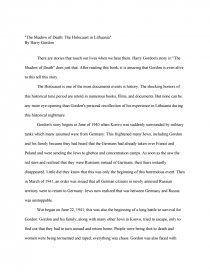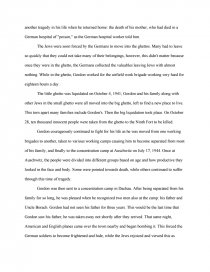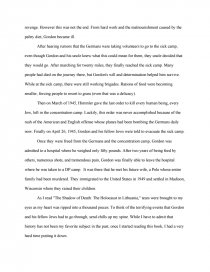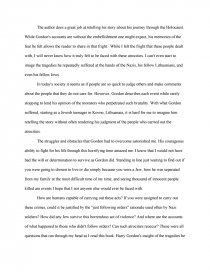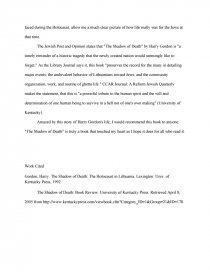The Shadow of Death: The Holocaust in Lithuania
Essay by review • February 11, 2011 • Research Paper • 1,527 Words (7 Pages) • 1,481 Views
Essay Preview: The Shadow of Death: The Holocaust in Lithuania
"The Shadow of Death: The Holocaust in Lithuania"
By Harry Gordon
There are stories that touch our lives when we hear them. Harry Gordon's story in "The Shadow of Death" does just that. After reading this book, it is amazing that Gordon is even alive to this tell this story.
The Holocaust is one of the most documents events is history. The shocking horrors of this historical time period are retold in numerous books, films, and documents. But none can be any more eye-opening than Gordon's personal recollection of his experience in Lithuania during this historical nightmare.
Gordon's story begins in June of 1940 when Konvo was suddenly surrounded by military tanks which many assumed were from Germany. This frightened many Jews, including Gordon and his family because they had heard that the Germans had already taken over France and Poland and were sending the Jews to ghettos and concentration camps. As soon as the saw the red stars and realized that they were Russians instead of Germans, their fears instantly disappeared. Little did they know that this was only the beginning of this horrendous event. Then in March of 1941, an order was issued that all German citizens in newly annexed Russian territory were to return to Germany. Jews now realized that war between Germany and Russia was unstoppable.
War began on June 22, 1941; this was also the beginning of a long battle to survival for Gordon. Gordon and his family, along with many other Jews in Konvo, tried to escape, only to find out that they had to turn around and return home. People were being shot to death and women were being tormented and raped; everything was chaos. Gordon was also faced with another tragedy in his life when he returned home: the death of his mother, who had died in a German hospital of "poison," as the German hospital worker told him.
The Jews were soon forced by the Germans to move into the ghettos. Many had to leave so quickly that they could not take many of their belongings, however, this didn't matter because once they were in the ghetto, the Germans collected the valuables leaving Jews with almost nothing. While in the ghetto, Gordon worked for the airfield work brigade working very hard for eighteen hours a day.
The little ghetto was liquidated on October 4, 1941; Gordon and his family along with other Jews in the small ghetto were all moved into the big ghetto, left to find a new place to live. This torn apart many families include Gordon's. Then the big liquidation took place. On October 28, ten thousand innocent people were taken from the ghetto to the Ninth Fort to be killed.
Gordon courageously continued to fight for his life as he was moved from one working brigades to another, taken to various working camps causing him to become separated from most of his family, and finally to the concentration camp at Auschwitz on July 17, 1944. Once at Auschwitz, the people were divided into different groups based on age and how productive they looked in the face and body. Some were pointed towards death, while others continued to suffer through this time of tragedy.
Gordon was then sent to a concentration camp in Dachau. After being separated from his family for so long, he was pleased when he recognized two men also at the camp: his father and Uncle Borach. Gordon had not seen his father for three years. This would be the last time that Gordon saw his father; he was taken away not shortly after they arrived. That same night, American and English planes came over the town nearby and began bombing it. This forced the German soldiers to become frightened and hide, while the Jews rejoiced and viewed this as revenge. However this was not the end. From hard work and the malnourishment caused by the paltry diet, Gordon became ill.
After hearing rumors that the Germans were taking volunteers to go to the sick camp, even though Gordon and his uncle knew what this could mean for them, they uncle decided that they would go. After marching for twenty miles, they finally reached the sick camp. Many people had died on the journey there, but Gordon's will and determination helped him survive. While at the sick camp, there were still working brigades. Rations of food were becoming smaller, forcing people to resort to grass (even that was a delicacy).
Then on March of 1945, Himmler gave the last order to kill every human being, every Jew, left in the concentration camp. Luckily, this order was never accomplished because of the rush of the American and English offense whose planes had been bombing the Germans daily now. Finally on April 26, 1945, Gordon and his fellow Jews were told to evacuate the sick camp.
Once they were freed from the Germans and the concentration camp, Gordon was admitted to a hospital where he weighed only fifty pounds. After two years of being feed by others, numerous shots, and tremendous pain, Gordon was finally able to leave the hospital where he was taken to a DP camp. It was there that he met his future wife, a Pole whose entire family had been murdered. They immigrated to the United States in 1949 and settled in Madison, Wisconsin where they raised their children.
As I read "The Shadow of Death: The Holocaust in Lithuania," tears were brought to my eyes as my heart was ripped into a thousand pieces. To think of the terrifying events that Gordon and his
...
...
